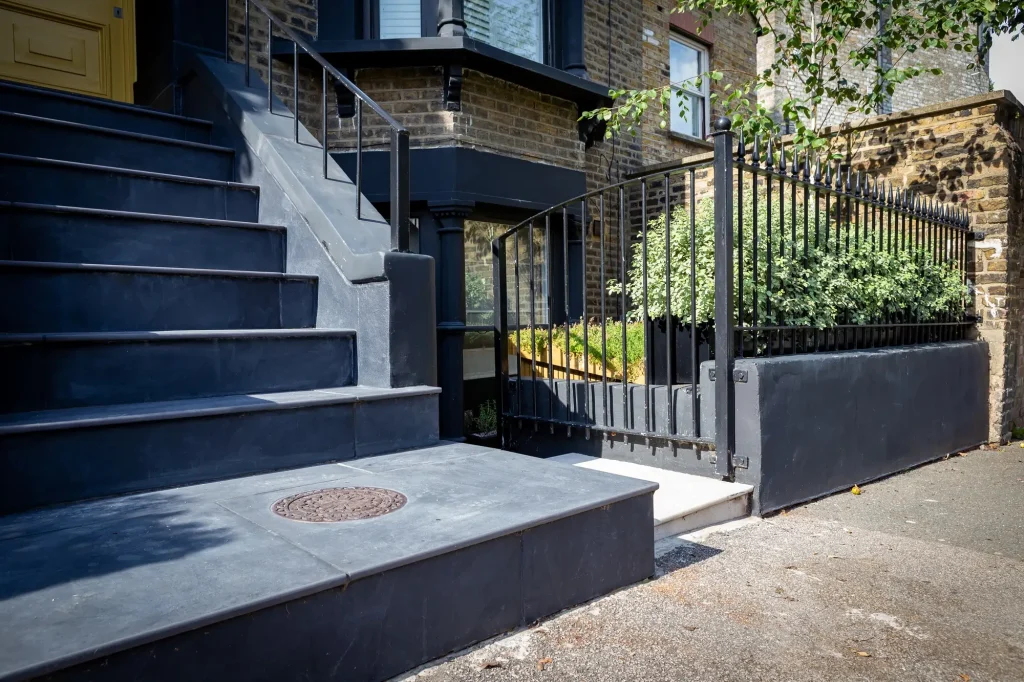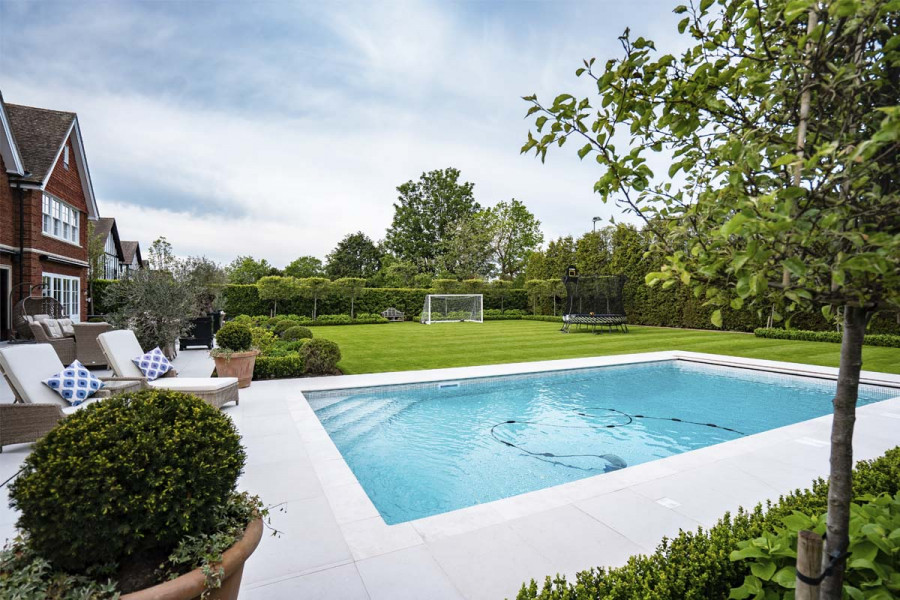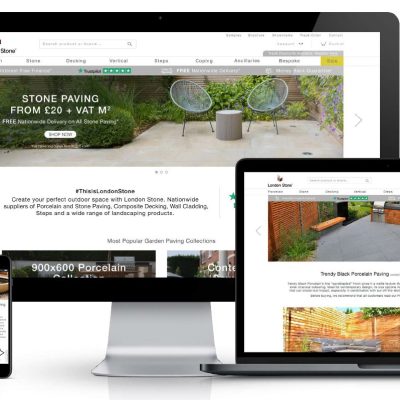If you're considering installing porcelain paving in your garden and you're concerned about the British weather, one of your main questions is likely to be 'Are porcelain outdoor tiles slippery?'
We answer that question and more, aiming to give you all the knowledge you need to make the right decision for your needs. Afterwards, if you'd like more help from our team, please get in touch.

The big question: are porcelain outdoor tiles slippery?
No. Good-quality porcelain is one of the most slip-resistant materials in the outdoor tile market at the moment.
This is due to the textured surface of porcelain paving slabs, manufactured into them specifically to create slip-resistance. This gives them the slip rating of >R11, the recommended rating for outdoor paving.
It's important to note that it's possible to slip on any paving or outdoor tile, regardless of its slip rating. This is because a number of factors are involved in accidents, from choice of footwear, to weather conditions, spillages and more. Whilst we cannot promise that there is no chance of slipping when using our tiles, it is very unlikely, as every tile we make has a minimum R Rating of R11 or more.
R ratings explained
When laying your porcelain paving, you should ensure your slabs have a high R Rating - the higher the rating, the less likely you are to slip.
The R in R rating stands for 'ramp' - when carrying out R Rating tests on paving materials, a tester walks up a ramp created from the material being tested, usually in everyday shoes or barefoot. The inclination of the test surface is increased as the tester walks up the ramp - when traction is lost (or the tester starts to slip), the angle reached at the time designates the R Rating (or slip-resistance) of the material.
R Ratings run between R9-R13, with R9 being the slippiest and R13 being the least slippy material. We're pleased to state that all our porcelain tiles have an R Rating of at least R11, ensuring a very good degree of slip-resistance.
Are porcelain tiles less slippery than other materials?

When it comes to choosing the perfect outdoor tiles for your garden, there's a wide range of paving options available. However, very few are as non-porous as porcelain, which can make it an excellent choice. Porcelain absorbs very little water, and moisture is usually implicated in slipperiness. After rain, slabs will also dry off faster than some of the less dense natural stone options and decking, as surface water evaporates and there is very little moisture left in the paving itself.
These factors make porcelain an excellent substitute for wooden decking. If you like the look of natural timber but you’d prefer something with a greater level of slip-resistance, take a look at our range of Wood Effect slabs.
You may have encountered the need to clean algae from paving before it turns slabs green and slippery. So, it's worth noting that porcelain is less likely to be affected and will need less attention. Its dense construction and low water-absorbency make it harder for algae to gain a foothold.
What factors affect slip-resistance?

However non-slip your paving might be, various factors can reduce slip-resistance, so it's important to mitigate any risks before they occur.
Factors that can potentially inhibit slip-resistance include:
- Contamination from other substances
- Wear and tear
- How often your tiles are cleaned and maintained
The importance of maintaining your porcelain outdoor tiles
Porcelain is an excellent material for outdoor spaces, as it's relatively easy to clean. Maintaining your outdoor porcelain tiles correctly ensures they retain their slip-resistant qualities. Even though porcelain has such low porosity, without regular cleaning, moss and algae will eventually grow on the surface, and dirt will accumulate. This stops the textured surface from behaving effectively and increases the risk of accidents.
Studies show that in rare cases, porcelain slabs may become slippery if they are damaged and the textured surface wears away. However, this is extremely unlikely to happen in a domestic setting, especially with outdoor porcelain tiles such as ours, which are made from high-quality materials and manufactured to the highest standards. To give you peace of mind on their quality, all our porcelain paving carries a 10-year warranty.
Regardless of the style of porcelain you choose, we always recommend keeping your paving clean and well-maintained. Not only will maintaining your paving ensure it looks stylish for many years to come, but it will also prevent damage.
Make an Informed Choice About Your Porcelain Outdoor Tiles
In summary, porcelain is a reassuringly slip-resistant paving material. We hope you now feel you have a better understanding of whether porcelain tiles are slippery and how to keep them in tiptop shape to ensure your patio is as slip-resistant as possible.
If you’d like more advice before making a purchase, our WhatsApp team will be happy to help or our experienced staff are ready to speak on the phone. If you’re ready to start laying your tiles, please add your preferred items to your shopping cart and we’ll ship them out to you as soon as possible.

/filters:quality(40)/mediadev/media/homepage/price_right_arrow.svg)
/filters:quality(60)/mediadev/media/menu-pics/menu_banner_mobile.png )
/filters:quality(60)/mediadev/media/menu-pics/all-porcelain.jpg )
/filters:quality(60)/mediadev/media/menu-pics/premium-italian.jpg )
/filters:quality(60)/mediadev/media/menu-pics/budget-porcelain.jpg )
/filters:quality(60)/mediadev/media/menu-pics/large-format-porcelain.jpg )
/filters:quality(60)/mediadev/media/menu-pics/wood-effect-porcelain.jpg )
/filters:quality(60)/mediadev/media/menu-pics/porcelain-planks.jpg )
/filters:quality(60)/mediadev/media/menu-pics/porcelain-setts.jpg )
/filters:quality(60)/mediadev/media/menu-pics/browse-all-paving.jpg )
/filters:quality(60)/mediadev/media/menu-pics/stone-paving.jpg )
/filters:quality(60)/mediadev/media/menu-pics/interior-tiles.jpg )
/filters:quality(60)/mediadev/media/menu-pics/stone-effect-porcelain.png )
/filters:quality(60)/mediadev/media/menu-pics/wood-effect-porcelain.png )
/filters:quality(60)/mediadev/media/menu-pics/grey-porcelain.png )
/filters:quality(60)/mediadev/media/menu-pics/beige-porcelain.png )
/filters:quality(60)/mediadev/media/menu-pics/dark-porcelain.png )
/filters:quality(60)/mediadev/media/menu-pics/light-porcelain.png )
/filters:quality(60)/mediadev/media/menu-pics/patio-grout.jpg)
/filters:quality(60)/mediadev/media/menu-pics/primers.jpg)
/filters:quality(60)/mediadev/media/menu-pics/porcelain-blades.jpg)
/filters:quality(90)/mediadev/media/menu-pics/drainage.jpg)
/filters:quality(60)/mediadev/media/menu-pics/cleaners.jpg)
/filters:quality(60)/mediadev/media/menu-pics/all-stone-paving.jpg )
/filters:quality(60)/mediadev/media/menu-pics/all-sawn-paving.jpg )
/filters:quality(60)/mediadev/media/menu-pics/all-riven-paving.jpg )
/filters:quality(60)/mediadev/media/menu-pics/indian-sandstone.jpg )
/filters:quality(60)/mediadev/media/menu-pics/limestone-paving.jpg )
/filters:quality(60)/mediadev/media/menu-pics/granite-paving.jpg )
/filters:quality(60)/mediadev/media/menu-pics/slate-paving.jpg )
/filters:quality(60)/mediadev/media/menu-pics/yorkstone-paving.jpg )
/filters:quality(60)/mediadev/media/menu-pics/stone-pavers.jpg )
/filters:quality(60)/mediadev/media/menu-pics/cobbles-setts.jpg )
/filters:quality(60)/mediadev/media/menu-pics/plank-paving.jpg )
/filters:quality(60)/mediadev/media/menu-pics/paving-circles.jpg )
/filters:quality(60)/mediadev/media/menu-pics/bespoke-paving-1.jpg )
/filters:quality(60)/mediadev/media/menu-pics/edging-stones-1.jpg )
/filters:quality(60)/mediadev/media/menu-pics/prestige-stone.jpg )
/filters:quality(60)/mediadev/media/menu-pics/grey-blue-stone.png)
/filters:quality(60)/mediadev/media/menu-pics/swatch-black-dark.jpg )
/filters:quality(60)/mediadev/media/menu-pics/swatch-buff-beige-white.jpg )
/filters:quality(60)/mediadev/media/menu-pics/sealants.jpg)
/filters:quality(60)/mediadev/media/menu-pics/all-clay-paving.jpg )
/filters:quality(60)/mediadev/media/menu-pics/alpha-clay-pavers.jpg )
/filters:quality(60)/mediadev/media/menu-pics/cottage-garden-clay-pavers.jpg )
/filters:quality(60)/mediadev/media/menu-pics/kessel-garden-clay-pavers.jpg )
/filters:quality(60)/mediadev/media/menu-pics/artisan-clay-pavers.jpg )
/filters:quality(60)/mediadev/media/menu-pics/grey-blue-clay-paver.png )
/filters:quality(60)/mediadev/media/menu-pics/red-brown-clay-pavers.png )
/filters:quality(60)/mediadev/media/menu-pics/beige-buff-clay-pavers.png )
/filters:quality(60)/mediadev/media/menu-pics/composite-decking.jpg )
/filters:quality(60)/mediadev/media/menu-pics/designboard-decking.jpg )
/filters:quality(60)/mediadev/media/menu-pics/classic-designboard.jpg )
/filters:quality(60)/mediadev/media/menu-pics/brushed-designboard.jpg )
/filters:quality(60)/mediadev/media/menu-pics/grooved-designboard.jpg )
/filters:quality(60)/mediadev/media/menu-pics/millboard-decking.jpg )
/filters:quality(60)/mediadev/media/menu-pics/grey-decking.jpg )
/filters:quality(60)/mediadev/media/menu-pics/black-charcoal-decking.jpg)
/filters:quality(60)/mediadev/media/menu-pics/brown-decking.jpg)
/filters:quality(60)/mediadev/media/menu-pics/all-build-deck.png )
/filters:quality(60)/mediadev/media/menu-pics/millboard-cladding.jpg )
/filters:quality(60)/mediadev/media/menu-pics/stone-cladding.jpg )
/filters:quality(60)/mediadev/media/menu-pics/all-garden-walling-1.jpg )
/filters:quality(60)/mediadev/media/menu-pics/facing-bricks.jpg )
/filters:quality(60)/mediadev/media/menu-pics/garden-screening.jpg )
/filters:quality(60)/mediadev/media/menu-pics/menu_Garden_banner_desk.png )
/filters:quality(60)/mediadev/media/menu-pics/stone-garden-steps.jpg )
/filters:quality(60)/mediadev/media/menu-pics/sawn-steps.jpg )
/filters:quality(60)/mediadev/media/menu-pics/yorkstone-steps.jpg )
/filters:quality(60)/mediadev/media/menu-pics/porcelain-steps.jpg )
/filters:quality(60)/mediadev/media/menu-pics/bespoke-steps.jpg )
/filters:quality(60)/mediadev/media/menu-pics/stone-coping.jpg )
/filters:quality(60)/mediadev/media/menu-pics/sawn-coping.jpg )
/filters:quality(60)/mediadev/media/menu-pics/yorkstone-coping.jpg )
/filters:quality(60)/mediadev/media/menu-pics/porcelain-coping.jpg )
/filters:quality(60)/mediadev/media/menu-pics/stone-pier-caps.jpg )
/filters:quality(60)/mediadev/media/menu-pics/bespoke-coping.jpg )
/filters:quality(60)/mediadev/media/menu-pics/all-bespoke-services.jpg )
/filters:quality(60)/mediadev/media/menu-pics/bespoke-paving-2.jpg )
/filters:quality(60)/mediadev/media/menu-pics/bespoke-steps-1.jpg )
/filters:quality(60)/mediadev/media/menu-pics/bespoke-coping-1.jpg )
/filters:quality(60)/mediadev/media/menu-pics/edge-profiles.jpg )
/filters:quality(60)/mediadev/media/menu-pics/masonry-services.jpg )
/filters:quality(60)/mediadev/media/menu-pics/deluxe-pergolas.jpg )
/filters:quality(60)/mediadev/media/menu-pics/proteus-pergolas.jpg )
/filters:quality(60)/mediadev/media/menu-pics/corten_planter_menu.png )
 Trade Discount Available
Trade Discount Available FREE Nationwide Delivery
FREE Nationwide Delivery Nationwide Showrooms
Nationwide Showrooms Live Stock Levels
Live Stock Levels Split Packs Available
Split Packs Available

